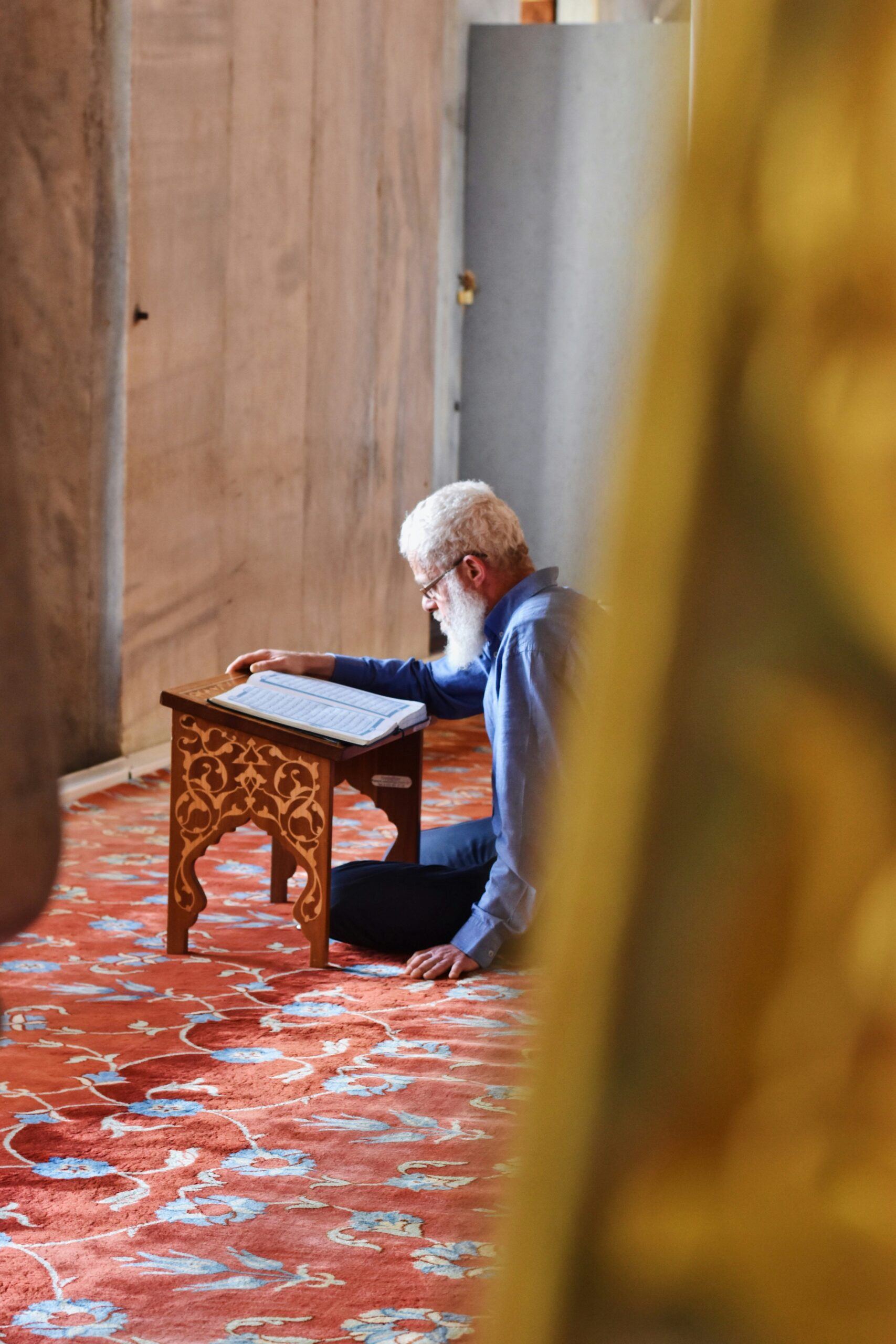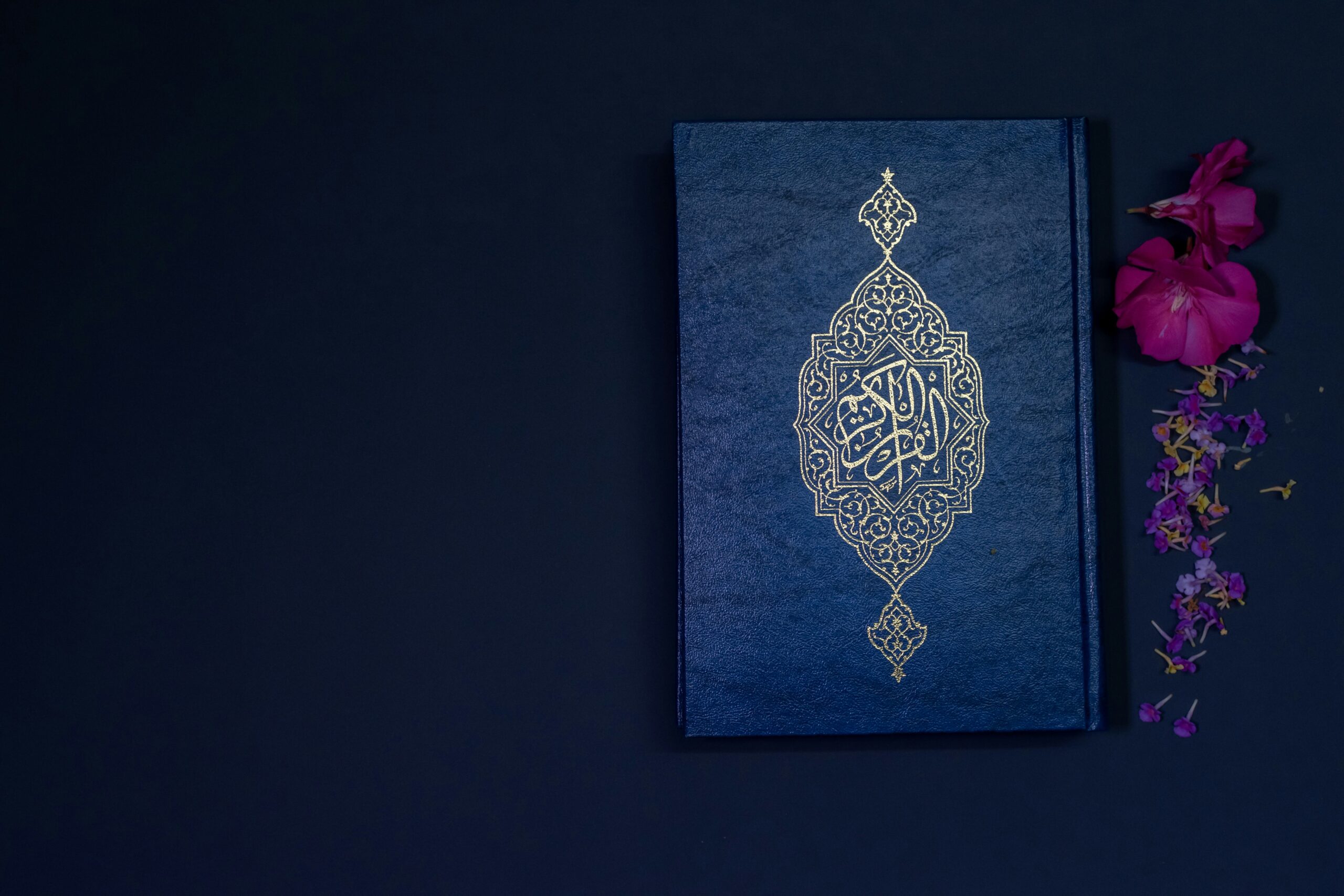
“ There was certainly in their stories a lesson for those of understanding. Never was the Qur’an a narration invented, but a confirmation of what was before it and a detailed explanation of all things.”
Quran 12:111
The last message
The Quran is the holy scripture of Islam and is considered the literal, verbatim word of God, revealed over 23 years to the Prophet Muhammad through the Angel Gabriel. Written in Arabic, it is the ultimate guide for Muslims, encompassing teachings on faith, morality, law, and personal and social conduct.

Core Themes
Monotheism (Tawhid): The Quran emphasizes God’s oneness, urging people to worship and submit to Him alone and learn about his majesty and glorious attributes.
Guidance for Life: It provides teachings on moral values, social justice, and lawful conduct, as well as specific laws related to marriage, inheritance, business, and other aspects of daily life.
Prophethood: The Quran tells the stories of many prophets, including Adam, Noah, Abraham, Moses, and Jesus, presenting them as models of faith and patience.
Hereafter: It frequently discusses the afterlife, describing Heaven and Hell and stressing accountability for one’s actions on Judgment Day.
Social Justice: It opposes all kinds of oppression or racism, emphasizes charity, and advocates for compassion, honesty, and equity in society.
“ O you who have believed, be persistently standing firm in justice, witnesses for Allah, even if it be against yourselves or parents and relatives. Whether one is rich or poor, Allah is more worthy of both.”
Quran 4:135
History
This preservation of the Quran is considered one of the miracles of the Quran among the Islamic faithful.

Compilation
This manuscript was kept safe until the third Caliph, Uthman, wanted to ensure everyone was reading the same book. He appointed a committee to compile and verify the Quranic text, ensuring its accuracy by cross-referencing with existing copies and oral recitations. The committee made a standard copy of the Quran and destroyed any copies that were tampered with it or had personal notes or writings. This way, the Quran became a single, standard version. That version has remained precisely the same ever since! Today, the Quran is printed and available on different devices worldwide. It’s a unique, unifying book that helps people understand and follow Islam.
“It is certainly We Who have revealed the Reminder, and it is certainly We Who will preserve it.”
Quran 2:177
Translation of the Qur’an
translations into other languages are the work of humans; they remain only “translation[s] of the meanings,” and there is always an element of human judgment involved in understanding and translating a text.
This factor is made more complex by the fact that Arabic is the most word-rich language in the world. It has many terms that need a whole sentence to explain (the Classical Arabic lexicon contains more than 12 million words), and a single word can have a variety of meanings, as in other languages.
For example, in chapter 112 of the Quran Allah says:
“Say, ˹O Prophet, ˺ “He is Allah—One ˹and Indivisible˺ (1) Allah—the Sustainer ˹needed by all.˺“Quran 112
In practice
1. Start with the Right Intention: Begin with the sincere intention of seeking knowledge and spiritual growth to understand and apply the teachings of the Quran in your life.
2. Find a Reliable Translation: If you are not proficient in Arabic, find a reliable translation in your language. Or learn Basic Arabic to enhance your understanding and connection with the Quran from the source.
3. Set a Regular Reading Schedule: Start with short chapters and focus on correct pronunciation. Begin with foundational chapters like Al-Fatiha, Al-Ikhlas, and An-Nas to build a strong foundation before moving to longer passages. Practice regularly and establish a routine. Set aside a consistent time each day or week to read the Quran. Consistent practice is key to improving fluency and retention.
4. Reflect on the Meaning (exegesis): Study the Quran to understand the deeper meanings and context of the verses. Read with reflection and contemplation. Don’t just recite the words, but ponder over the meanings and try to apply the teachings in your life.
5. Join a Study Group: Joining a Quran study group can provide support, motivation, and deeper insights. Discussing interpretations and applications with others can enhance your understanding.
6. Supplication: Continuously ask Allah for guidance, understanding, and the ability to implement His teachings. Make Dua before and after reading the Quran for increased benefit and blessings.
Practical Tips:
• Stay Consistent: Even if it’s a small amount, daily reading is more beneficial than sporadic long sessions.
• Take Notes: Not down reflections, questions, and new insights.
• Practice Humility: Approach the Quran with a humble heart, seeking to learn and grow.
Reading and practicing the Quran is a lifelong journey. The key is to remain patient, consistent, and sincere in your efforts.

Spirituality
1. Oneness of God
The central theme in the Qur’an is the concept of Tawhid, or the oneness of God. It calls believers to recognize and submit to a single, all-encompassing Creator, fostering a sense of unity and purpose in life. This oneness encourages believers to see God’s presence in every aspect of existence, guiding them toward humility and gratitude.
2. Inner Peace and Contentment
The Qur’an often speaks of “Sakina,” a tranquility that comes from a deep connection to God. By following the Qur’an’s guidance, believers are encouraged to overcome anxiety and find inner peace, particularly through prayer, remembrance, and reliance on God.
3. Self-Purification
Spiritual growth in the Qur’an involves constant self-purification, or “tazkiyah.” This process encourages believers to cultivate virtues like honesty, patience, and compassion while controlling negative traits like anger, greed, and arrogance. The aim is to achieve a state of spiritual refinement and closeness to God.
4. Compassion and Justice
The Qur’an emphasizes empathy and justice, encouraging believers to support the oppressed and give to the needy. Verses about helping others remind believers that spirituality is not limited to individual worship but extends to one’s responsibilities within the community.
5. Contemplation of Nature and Creation
Many Qur’anic verses invite believers to reflect on nature as a manifestation of God’s greatness. The Qur’an calls people to observe the skies, mountains, animals, and their own selves as signs (ayat) of God’s power and wisdom. This reflection is meant to deepen their sense of awe and gratitude.
6. Awareness of the Afterlife
The Qur’an emphasizes the temporary nature of worldly life and the importance of preparing for the hereafter. This awareness fosters a mindful life, reminding believers that their actions have consequences and that they should live with integrity, as they will be accountable to God.
7. Patience and Perseverance
“Sabr,” or patience, is a virtue the Qur’an frequently praises, especially in times of hardship. Spiritual resilience is seen as essential for developing a steadfast heart, trusting in God’s wisdom, and overcoming life’s tests.
8. Connection through Prayer and Remembrance
The Qur’an emphasizes regular prayer and remembrance as direct links to God. Prayer serves as a means to seek guidance, forgiveness, and strength, while dhikr (remembrance) maintains mindfulness of God in everyday life, enriching the believer’s spiritual consciousness.
9. Guidance for a Balanced Life
The Qur’an encourages balance between worldly responsibilities and spiritual pursuits, viewing them as complementary rather than contradictory. This balanced approach helps believers navigate the world without losing sight of their spiritual goals.
The spirituality of the Qur’an is holistic, guiding believers to cultivate an awareness of God, act ethically, and connect deeply with both the Creator and creation. It encourages growth and self-betterment, urging individuals to lead lives filled with purpose, compassion, and faith.

Summary
“ The Book of God, in which is the news of what came before you, and the news of what comes after you, and the ruling of what is between you. It is the Criterion (between right and wrong) without jest. Whoever among the oppressive abandons it, Allah crushes him, and whoever seeks guidance from other than it, then Allah leaves him to stray. It is the firm rope of Allah, it is the wise remembrance, it is the straight path, and it is the one that the desires cannot distort, nor can the tongues twist it, nor can the scholars ever have enough of it, and it shall not become dull from reciting it much, and the amazement of it does not diminish. It is the one that when the Jinns hear it, they did not hesitate to say about it: ‘Verily, we have heard a wonderful Recitation (this Qur’an)! ‘It guides to the Right Path, and we have believed therein.’ Whoever speaks according to it then he has said the truth, and whoever acts according to it he is rewarded, and whoever judges by it he has judged justly, and whoever invites to it then he guides to the straight path.”



What you’ve written here speaks not only to the mind but also to the soul, offering a sense of peace and understanding.
From a soul to another.
Thank you brother